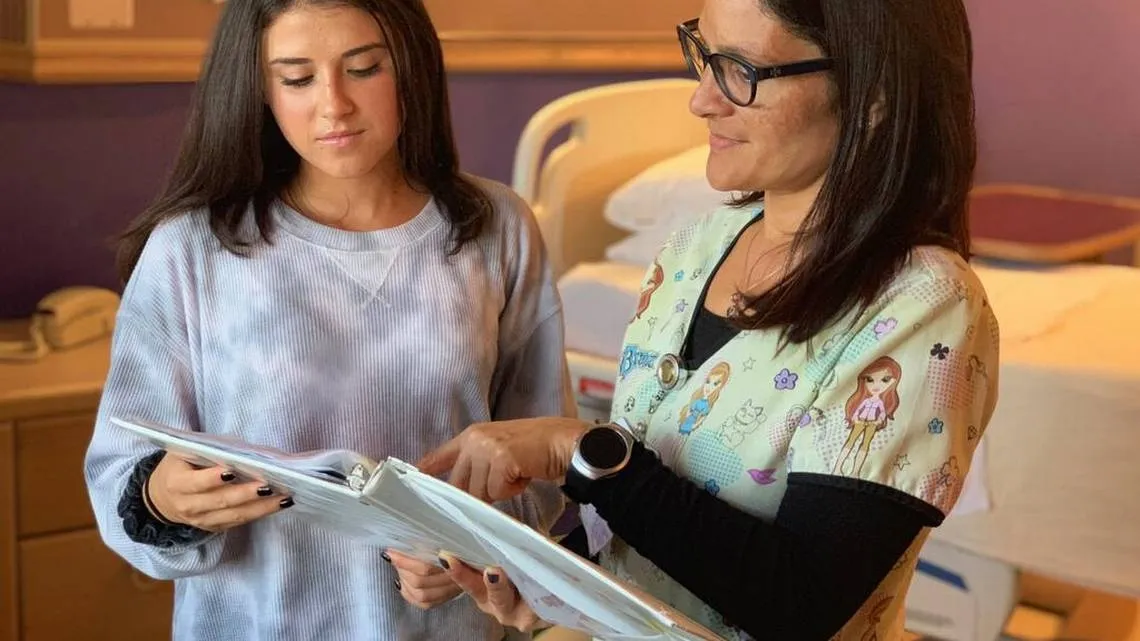Haley Gassenheimer played his clarinet during the reef band Reef High School in August when he got sick.
"I couldn't breathe," says Haley, 15."I was missing the air."
Haley was immediately taken to Baptist Children’s Hospital, where it was discovered that she suffered from diabetic ketoacidosis, a serious complication of diabetes that occurs when the body produces high levels of blood acids called ketones.
Haley was diagnosed with type 1 diabetes, a condition in which the pancreas produces little or no insulin.Insulin is a hormone necessary to feed cells to produce energy.
Type 1 diabetes usually begins during childhood or adolescence, but can be developed in adults.
Symptoms include excessive thirst, eating a lot and losing weight, says Baptist Children’s Hospital.Haley had experienced all these symptoms.
When blood sugar levels are high, the kidneys are difficult to process it, then sugar goes to urine.That produces frequent urination and dehydration.Weight loss is the result of the body does not absorb sugar, which has calories.
"A family may not realize because the symptoms begin gradually," says Chacón.That was what happened to Haley's family.
"I didn't realize that I had symptoms because everyone was fighting with heat during the band's practice," says Haley's mother, Patty Gassenheimer."I thought I was dehydrated."
Risk factors for type 1 diabetes include family history, genetics and age.
Zachary, Haley's older brother, was also diagnosed with type 1 diabetes when he was 16 years old.Seeing Haley's symptoms, he initially suggested to the family that Haley could have the same condition as him.
"At the beginning it was difficult for me (with the diagnosis)," says Haley.“But knowing that my brother has a normal life I knew I was going well.He was a good model.It made me feel safe and that it was going to be easier. ”
Haley had to comply with carbohydrate counting, one of the many food planning options to handle blood glucose levels, used more often by people who use insulin.Includes counting the number of grams of carbohydrates at a meal and adjusting it with a dose of insulin.
Monica Grimaldi, nutritionist and certified educator in Diabetes of Nicklaus Children’s Hospital, says it is important to eat whole grains such as whole wheats, quinoa, cuscous, which are lower in carbohydrates and higher in fibers than foods such as white rice or pasta.
Meals should also include vegetables and legumes such as beans, lentils and peas.Eating lean meats such as salmon and tuna, which have less saturated fat instead of red meat.
Coma fruits instead of drinking fruit juices and other sugary drinks.Stay away from processed sugars, sweetened drinks with sugar such as soft drinks, juices, cold tea and energy drinks.
"Sugarless drinks are fine, but read the nutritional label to verify carbohydrates," says Grimaldi."If you have carbohydrates, you have to count."
The regular exercise that incorporates aerobics and resistance training activities are also beneficial to the health of people with type 1 diabetes, including improving insulin sensitivity, cardiovascular aptitude and muscle strength.
The American Diabetes Association recommends a daily hour of physical activity and less than two hours of being in front of a screen.Physical activity may include bicycle, playing, dancing or practicing a sport, says Grimaldi."It must be some activity that enjoy and not something that is an obligation."
Teenagers mustRegularly measure glucose levels and not assume that they are fine because they feel good, says Dr. Mauricio Flores, Joe Dimaggio Children’s hospital in memorial.Pay attention to glucose levels, especially before handling, participating in aquatic sports or climbing.
"For older teenagers who go to university, we recommend avoiding alcohol as much as possible and letting your friends know that they are diabetic," says Flores.
Consuming alcohol can cause blood glucose to lower because alcohol blocks the production of glucose in the liver.
Haley has not let her diagnosis the Amilane.Even when she was hospitalized shortly before the new school year began, Haley returned to the band and attended the first day of class.
Diabetic children camps
Although a diagnosis can be a great change in a child's lifestyle, two camps that are carried out in hospitals in the area can help children educated on the disease while having fun.
Camp Coral Kids, a summer camp with medical supervision for children with type 1 diabetes, with Broward Health, is held all summers for two weeks in Coral Springs.
The daytime camp provides educational periods such as learning to measure blood sugar, says Kathy Byrne, RN and director of Camp Coral Kids."They realize that they are not just children with type 1 diabetes," says Byrne.“That being different makes them special and develop friendship with other camp participants.At school, children have to leave the classroom to measure blood sugar.In the camp, everyone is doing it. ”
For information on Camp Coral Kids, visit Browardhealth.org/camp O (954) 344-3344.
Joe Dimaggio Children’s Hospital in Memorial also has Camp Gene, a summer camp with medical supervision for children with diabetes, sponsored by the American Diabetes Association.
In Camp Gene, children know other children with diabetes while developing social skills, self -respect for life.They also learn more about a healthy lifestyle through education, nutrition, exercise, emotional well -being and glucose control.
For information on Camp Gene, contact Michelle Foster at mfoster@diabetes.org O (407) 660-1926 ext.4643.


